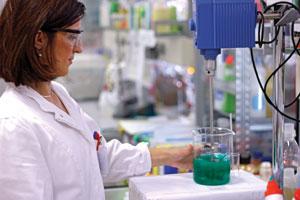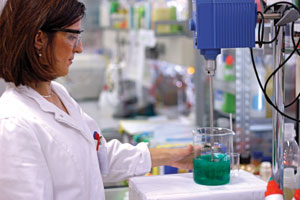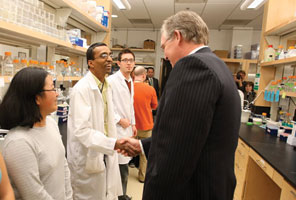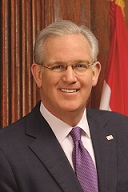
 Innovation. Webster’s Dictionary defines it as the introduction of something new; a new idea, method, device or novelty.
Innovation. Webster’s Dictionary defines it as the introduction of something new; a new idea, method, device or novelty.
Innovation builds on new knowledge and new technology – whether it is the development of new veterinary vaccines, the production of healthier food for livestock, or cutting-edge therapies for Alzheimer's disease or juvenile diabetes. Developing those goods and services, in turn, makes us more competitive in the global marketplace, and improves our quality of life at home.
Innovation is a critical component, the core challenge to the future of the biosciences industry in the State of Missouri.
“We face tremendous opportunities to transform our economy for the 21st century,” Missouri Governor Jay Nixon said. “It is vital that we not only bolster our existing high-tech and innovative employers, but also bring more of these cutting-edge companies and their 21st century jobs to our state.”
As governor of Missouri, Nixon has been committed to championing initiatives that drive growth and investment in sciences and technology. These include outpacing the state’s rivals to recruit new life science and high-tech businesses to its borders; leveraging every tool and tactic to help loyal Missouri businesses thrive; and training a workforce today that is prepared to meet the demand for the high-tech, life science jobs of tomorrow.
As a result of that commitment, the state continues to see steady growth in the biosciences industry. That upward trajectory is expected to accelerate to even greater heights in the future.
With 4,000 bio-tech, agribusinesses and life science companies operating within the state’s borders, Missouri is a recognized leader in biotechnology and a growing international center of biopharmaceuticals, biomedical research and plant sciences. The Show Me State currently ranks fifth in National Science Foundation funding for the life sciences.
The bioscience industry is living up to its promise of creating sustainable, high-paying jobs in communities across Missouri. Drawing on our rich agricultural history, Missouri’s growing bioscience industry is deeply rooted in specialties such as animal health and plant science. For large and small businesses alike, Missouri is increasingly recognized as the place to do business in these exciting areas of bioscience.
The internationally recognized KC Animal Health Corridor – the area stretching from Columbia, Missouri, to Manhattan, Kansas – accounts for one-third of the $19 billion (and growing) global animal health industry. Boehringer Ingelheim Vetmedica in St. Joseph is undergoing a $130 million expansion of its R&D and manufacturing operations to meet worldwide demand for its animal health products. Recently, competitively selected entrepreneurial animal health companies from around the country convened in Kansas City to meet with potential investors at the KC Animal Health Investment Forum. This preeminent showcase event reminded the world that the greater Kansas City region is the place to be in animal health.
Anchored by companies like Monsanto and the research powerhouse Donald Danforth Plant Science Center, the St. Louis region is home to more plant scientists than anywhere else in the world. This hub of expertise is attracting and growing new companies that are at the cutting edge of producing higher crop yields, alternative fuels, and a cleaner environment.
Over the past year, state officials have been successful in leveraging this expertise into Southeast and Northeast Missouri. Pioneer Hi-Bred, one of the most recognized brands in agricultural plant science, broke ground on a new $55 million advanced soybean growing and conditioning facility in New Madrid County. In Mexico, Missouri, ground was broken on the new Missouri Plant Science Center. The nearly 25,000-square-foot facility is being jointly developed by the Missouri Technology Corporation, University of Missouri system, and the City of Mexico. It will house traditional offices, wet and dry laboratories, and pilot-scale manufacturing equipment that will process soybeans and other plant-based material into value-added products. The first tenant will be Soy Labs LLC – an emerging, research-driven company that produces soy-based ingredients principally for the food and health industries – that will relocate from Fairfield, California.
Missouri is enjoying a big year in bioscience, but is not resting on past success. Planning for the future is a must to maintain momentum in this competitive and dynamic industry. The Missouri Technology Corporation operates from a relatively modest, one-time appropriation of funds. Future resources will be needed in order for Missouri to sustain its vision of leveraging the state’s rich agricultural history to help create new high-paying jobs, attract capital investment, and provide tools to help entrepreneurs grow new Missouri-based companies.
But just as important as job creation are the corollaries of that growth.
These include the opportunities for synergy; the creation of a culture of excellence and collaboration; a forum where brilliant minds find kindred spirits; a hotbed of ideas that spark innovation; and a nexus of risk and reward, where start-ups thrive.
 Last year, Gov. Nixon announced a bold initiative that would transform Missouri’s bioscience industry – the Missouri Science and Innovation Reinvestment Act, or simply, MOSIRA. This legislation would create a performance-based funding mechanism that would provide the Missouri Technology Corporation with the resources needed to maintain the bioscience momentum in Missouri. Within the Kansas City region specifically, the combined efforts of the Missouri Technology Corporation with MOSIRA and the Kansas Bioscience Authority could propel the KC Animal Health Corridor to new heights.
Last year, Gov. Nixon announced a bold initiative that would transform Missouri’s bioscience industry – the Missouri Science and Innovation Reinvestment Act, or simply, MOSIRA. This legislation would create a performance-based funding mechanism that would provide the Missouri Technology Corporation with the resources needed to maintain the bioscience momentum in Missouri. Within the Kansas City region specifically, the combined efforts of the Missouri Technology Corporation with MOSIRA and the Kansas Bioscience Authority could propel the KC Animal Health Corridor to new heights.
MOSIRA will help Missouri recruit more dynamic, science and technology companies like Synbiotics, Cerner and Boehringer-Ingleheim.
Governor Nixon’s MOSIRA initiative enjoys broad bipartisan support in the General Assembly and is backed by a statewide coalition of business, civic and economic development organizations. The Missouri General Assembly will be taking up Governor Nixon’s MOSIRA legislation in the coming legislative session, with the potential to position Missouri to be a bioscience leader for decades to come.
True innovation is not a happy accident.
One of America's most gifted innovators, Benjamin Franklin, said, "I'm a strong believer in luck and I find the harder I work, the more I have."
To revive and harness that restless American spirit of innovation takes real vision, careful planning, close collaboration and serious investment.
This thriving animal health corridor and our burgeoning biosciences industry overall are not happy accidents. Both are the products of real vision, careful planning and close collaboration.
It took serious investment, not just in buildings and laboratories and start-ups, but in intellectual capital. It would not have happened without a sustained commitment to advanced degree programs in life sciences at Missouri’s state universities, or the recruitment of the top-flight scientific talent that reside and work within the state’s borders.
There can be no doubt that with its “We can do it” outlook, Missouri is poised to lead the nation in innovation, and create a vibrant future for the people of its state.

